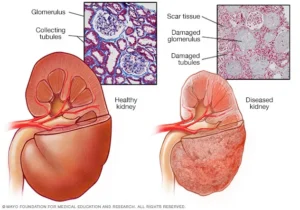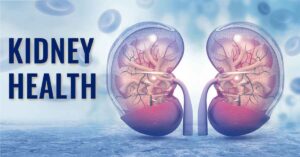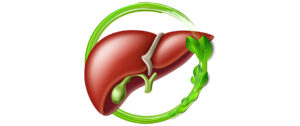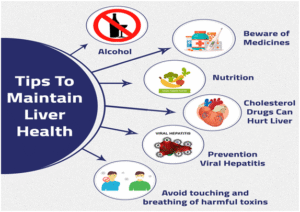Everything to Know About Your Kidney Health
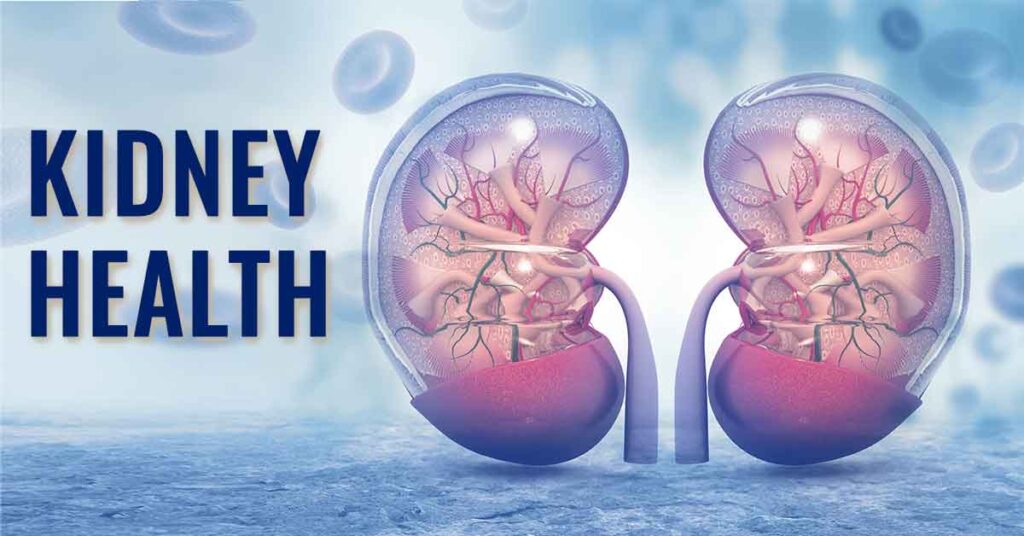
Your kidneys filter waste, balance fluids, control blood pressure, and support bone and red blood cell health. Understanding how they function and recognizing early signs of trouble are key to maintaining lifelong kidney health.
Key Takeaways:
- Kidneys filter about 200 quarts of blood daily, removing waste and extra fluid.
- eGFR and urine ACR tests detect early kidney damage before symptoms appear.
- Diabetes and high blood pressure are the leading causes of chronic kidney disease.
- Regular screening helps prevent or slow progression of kidney problems.
- Healthy lifestyle choices balanced diet, hydration, weight control, and no smoking protect kidney function.
- Avoid overuse of painkillers and unverified herbal supplements to prevent kidney strain.
Understanding the Kidneys
Your kidneys sit just below your ribs on either side of your spine. Each one is about the size of a fist and shaped like a bean. Together, they filter about 200 quarts of blood every day, removing waste and extra water to produce urine.
The kidneys are part of your urinary system, working alongside the bladder, ureters, and urethra. Their main job is to clean your blood, but they also manage several vital functions that affect nearly every part of your body.
Core Functions of the Kidneys
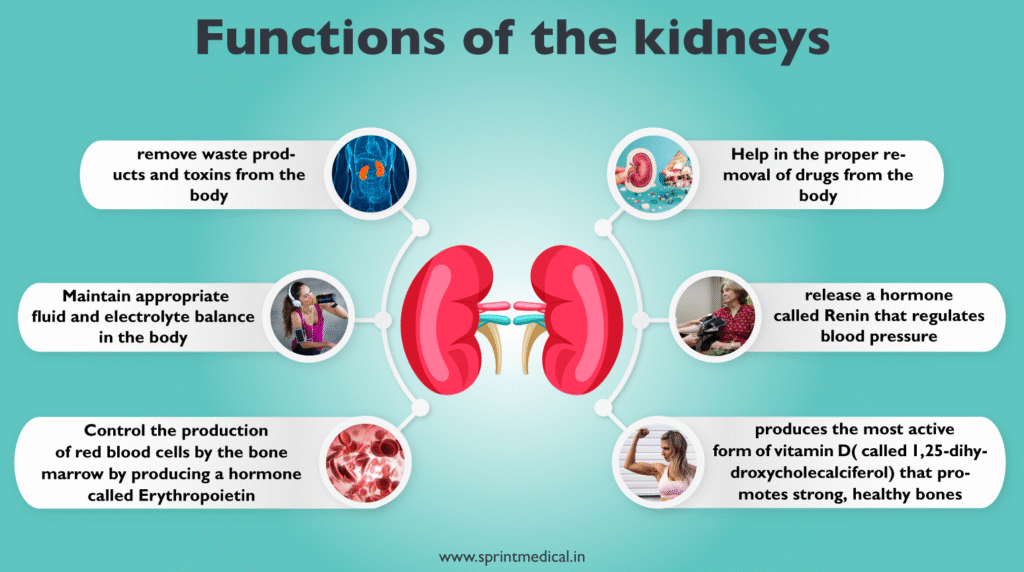
Your kidneys are small but powerful multitaskers that quietly keep your body in balance every minute of the day. They act like a built-in filtration and regulation system, cleaning the blood, adjusting fluids, and maintaining vital chemical levels.
1. Filter Waste
Every day, your kidneys filter around 50 gallons of blood to remove waste products like urea and creatinine.
- Urea comes from the breakdown of proteins in your diet.
- Creatinine is produced when muscles use energy.
These wastes move from your blood into your urine so they can leave the body safely. Without this process, harmful substances would build up, causing fatigue, nausea, and eventually serious illness.
2. Regulate Fluid Balance
Your kidneys decide how much water your body keeps or releases.
- When you’re dehydrated, they conserve water by making your urine darker and more concentrated.
- When you’ve had plenty of fluids, they release more water to keep levels normal.
This constant adjustment prevents swelling, dehydration, and changes in blood pressure.
3. Maintain Electrolyte Levels
Electrolytes such as sodium, potassium, calcium, and phosphorus are minerals that carry electrical charges and help your nerves and muscles work properly. Your kidneys maintain a delicate balance of these minerals by filtering the right amounts into your urine.
For example:
- Too much potassium can cause irregular heartbeats.
- Too little sodium can make you weak and dizzy.
The kidneys correct these imbalances automatically.
4. Control Blood Pressure
Your kidneys help regulate blood pressure through a hormone called renin.When blood flow to the kidneys drops, they release renin, which starts a chain reaction that tightens blood vessels and raises blood pressure.This keeps blood moving steadily through all your organs. When this system becomes overactive, it can contribute to high blood pressure, which is why kidney and heart health are closely linked.
5. Support Bone Health
Healthy bones depend on healthy kidneys. Your kidneys activate vitamin D into its usable form, calcitriol, which helps your intestines absorb calcium from food. If the kidneys can’t make enough active vitamin D, your body can’t absorb calcium properly, leading to weak bones and a higher risk of fractures.
6. Produce Red Blood Cells
The kidneys make a hormone called erythropoietin (EPO).When oxygen levels in your blood fall, your kidneys release EPO, which tells your bone marrow to produce more red blood cells. This process ensures your tissues get enough oxygen to stay healthy and energized. When kidney function declines, EPO levels drop, leading to anemia and fatigue.
How Kidney Function Is Measured
Kidney problems often start quietly. You might feel completely fine even when your kidneys are already under stress. Because symptoms appear late, regular testing is the most reliable way to check how well your kidneys are working. Doctors use a combination of blood, urine, and imaging tests to assess kidney function and detect damage early.
Blood Test for Creatinine
Creatinine is a waste product made when your muscles use energy. Healthy kidneys filter creatinine out of your blood and pass it into your urine. If your creatinine level rises, it usually means your kidneys aren’t filtering efficiently.This is often the first sign that kidney function might be declining.Doctors look at your creatinine level along with other factors such as age, sex, and muscle mass to estimate overall kidney performance.
eGFR (Estimated Glomerular Filtration Rate)
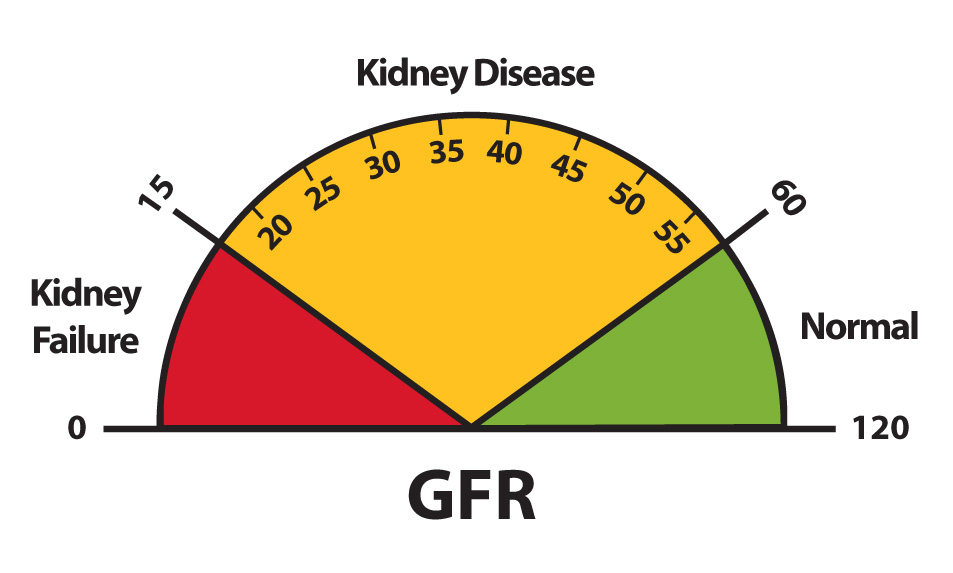
The eGFR is one of the most important indicators of kidney health. It estimates how much blood your kidneys filter each minute. A normal eGFR is typically 90 or higher. Lower values suggest reduced kidney function:
- 60–89 may indicate mild impairment
- 30–59 shows moderate decline
- Below 30 indicates severe loss or possible failure
Your doctor tracks this number over time. A single low reading doesn’t always mean disease, but a steady drop can signal chronic kidney damage.
Urine Albumin-to-Creatinine Ratio (ACR)
This test looks for protein (albumin) in your urine.Normally, protein stays in your bloodstream, but when the kidney’s filters are damaged, small amounts can leak through. Even a slight rise in urine protein is an early sign of kidney stress, especially in people with diabetes or high blood pressure. The ACR test can detect these tiny leaks before major damage occurs, allowing early intervention.
Urinalysis
A urinalysis gives a quick snapshot of kidney and urinary tract health.
It checks:
- Color and clarity: Cloudy or dark urine may point to infection or dehydration.
- Chemical levels: Measures pH, glucose, protein, and other markers.
- Microscopic content: Looks for red or white blood cells, crystals, or bacteria.
This simple test can detect problems like infection, stones, or early signs of chronic disease.
Imaging Tests
If blood or urine tests show possible kidney issues, imaging helps doctors see what’s happening inside.
- Ultrasound: Uses sound waves to check kidney size, shape, and flow. It can reveal cysts, stones, or blockages
- CT scan or MRI: Offers detailed images of the kidneys and urinary tract to detect tumors, structural abnormalities, or obstructions.
These scans don’t measure function directly but are useful for understanding physical causes of kidney problems.
Kidney Biopsy
When other tests can’t explain the cause of kidney damage, a biopsy provides more answers. During this procedure, a doctor removes a tiny piece of kidney tissue with a needle. Under a microscope, specialists can identify inflammation, scarring, or specific diseases such as glomerulonephritis or autoimmune conditions. Although it sounds intimidating, the procedure is safe and gives valuable information for treatment planning.
When to Get Tested
You can’t always feel when your kidneys are in trouble. Because kidney disease often develops quietly, it’s important to get tested regularly if you fall into certain risk groups. Early testing can prevent long-term damage and help your doctor track how well your kidneys are functioning.
- People with Diabetes: High blood sugar can damage the small blood vessels that filter waste in your kidneys. This condition, called diabetic kidney disease, is a leading cause of kidney failure. If you have type 1 or type 2 diabetes, your doctor should check your urine ACR and eGFR at least once every year. These tests show how well your kidneys are handling blood sugar and whether damage is beginning.
- People with High Blood Pressure: High blood pressure puts extra strain on the kidneys, forcing them to work harder and wear out faster. If you take medication for hypertension or have readings consistently above normal, your kidney function should be tested every 6 to 12 months to make sure the kidneys remain healthy.
- Family History of Kidney Disease: If someone in your family has had chronic kidney disease (CKD) or polycystic kidney disease (PKD), you may have a higher genetic risk. Even if you don’t have symptoms, getting tested once a year can detect early changes before they become serious.
- People Over 60: Kidney performance naturally slows down with age. After age 60, include kidney tests as part of your annual physical exam. This helps identify early decline and gives your doctor a baseline to monitor over time.
- Long-Term Medication Use: Certain drugs can stress the kidneys when taken regularly over long periods.Common examples include NSAIDs (ibuprofen, naproxen), Some antibiotics, Lithium and other psychiatric medications. If you use these often, ask your doctor for periodic kidney tests to ensure your kidneys are handling them safely.
- People with Heart Disease or Stroke: Your heart and kidneys work closely together. If you’ve had heart disease, heart failure, or a stroke, your kidneys may also be at risk. Testing your kidney function regularly helps detect early changes linked to poor circulation or medication side effects.
- People Who Are Overweight or Have Metabolic Syndrome: Extra body weight, high cholesterol, and insulin resistance can make your kidneys work harder. If you are overweight or have metabolic syndrome, include annual kidney screening in your health routine to catch any stress or imbalance early.
Stages of Kidney Health and Disease
Kidney function isn’t all or nothing. It gradually changes across five stages.
| Stage | eGFR (mL/min) | Condition | What It Means |
| 1 | 90 or higher | Normal function but may have mild damage | Usually no symptoms |
| 2 | 60–89 | Mildly reduced function | Monitor and manage risk factors |
| 3 | 30–59 | Moderate loss of function | Possible symptoms and complications |
| 4 | 15–29 | Severe loss of function | Likely symptoms, prepare for treatment |
| 5 | Below 15 | Kidney failure | Requires dialysis or transplant |
Major Risk Factors for Poor Kidney Health
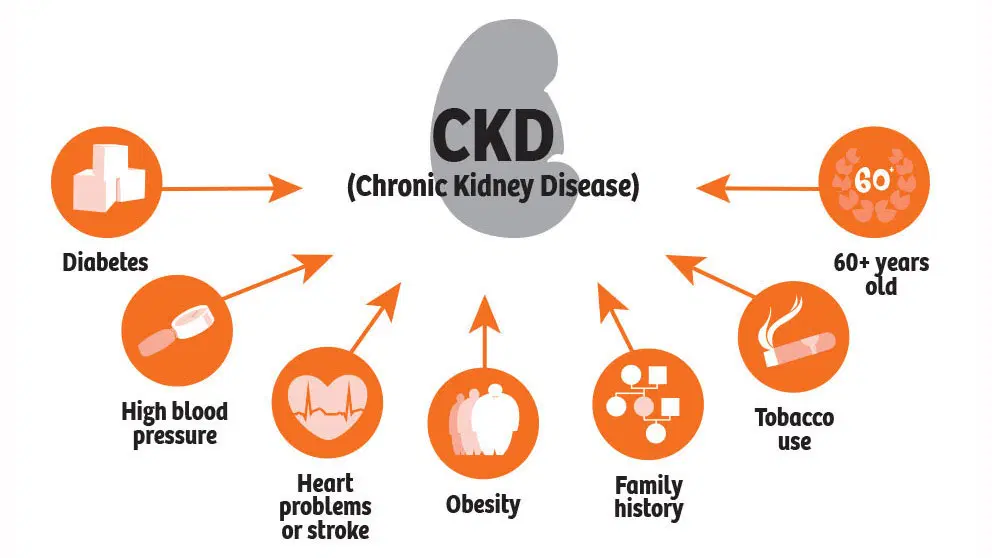
Kidney problems rarely appear without reason. They usually develop slowly due to ongoing conditions or lifestyle habits that place stress on the kidneys. Understanding the main risk factors can help prevent damage before it begins.
1. Diabetes
Diabetes is the leading cause of kidney failure worldwide.High blood sugar damages the small blood vessels inside the kidneys, reducing their ability to filter waste effectively. Over time, the filtering units, called nephrons, become scarred and lose function.This gradual process is known as diabetic kidney disease.
People with diabetes should:
- Keep blood sugar, blood pressure, and cholesterol levels under control
- Get urine ACR and eGFR tests every year
- Maintain a healthy diet and stay active
2. High Blood Pressure
Uncontrolled blood pressure puts continuous strain on the kidney’s blood vessels. As pressure rises, these vessels become stiff and narrow, reducing blood flow and filtration. When kidneys are damaged, they can’t regulate blood pressure properly, creating a harmful cycle high blood pressure worsens kidney disease, and kidney disease increases blood pressure. Keeping blood pressure below 130/80 mmHg helps prevent this cycle and protects kidney function.
3. Obesity and Metabolic Syndrome
Carrying extra body weight affects more than your appearance; it changes how your kidneys work. Obesity causes inflammation and alters the kidney’s metabolism. It also raises the risk of diabetes and hypertension, both major contributors to kidney disease. When the kidneys have to filter more blood than normal, they experience hyperfiltration, which can lead to scarring and long-term damage. Losing even 5–10% of your body weight can ease pressure on the kidneys and improve overall function.
4. Family History and Genetics
Some people are born with a higher risk of kidney problems. Inherited conditions such as polycystic kidney disease (PKD) cause cysts to grow inside the kidneys, gradually enlarging them and reducing their ability to function. If a close relative has PKD or another genetic kidney disorder, talk to your doctor about:
- Regular checkups and imaging tests
- Early screening for kidney function
- Genetic counseling, if appropriate
5. Medications and Toxins
Some medicines and chemicals can harm the kidneys, especially with frequent or long-term use.
Common examples include:
- NSAIDs (ibuprofen, naproxen) used for pain relief
- Certain antibiotics like gentamicin
- Lithium, used for mental health treatment
- Contrast dyes used in medical imaging
Always follow prescribed doses, and never take these medications without medical supervision if you already have kidney or heart problems.
6. Lifestyle Factors
Everyday choices have a direct impact on kidney performance. Habits that can harm kidney health include:
- Smoking, which narrows blood vessels and reduces oxygen flow to the kidneys
- Chronic dehydration, which forces the kidneys to overwork
- High-salt diets, which raise blood pressure and fluid retention
- Processed and fast foods, high in sodium, phosphorus, and preservatives
Recognizing the Symptoms of Kidney Trouble
Kidney problems can sneak up quietly. Early stages usually cause no pain or obvious signs. When symptoms do appear, they’re often subtle.
1. Swelling in Feet, Ankles, or Hands (Edema)
When kidneys are not functioning properly, they fail to remove extra salt and water from the body. This fluid then collects in tissues, especially in areas farthest from the heart such as the feet, ankles, and hands.
- Why it happens: The kidneys’ filtration system becomes damaged, allowing fluid and sodium to build up in the bloodstream and tissues.
- What it looks like: Puffiness, tight shoes or rings, and indentations on the skin after pressing (called pitting edema).
- Other causes: Heart failure or liver problems can also cause similar swelling, but kidney-related swelling often worsens in the morning.
2. Fatigue or Weakness
Healthy kidneys produce erythropoietin (EPO) a hormone that stimulates bone marrow to make red blood cells, which carry oxygen.
- When kidneys fail, EPO production drops, leading to anemia (low red blood cell count).
- Effect: Less oxygen reaches muscles and the brain, resulting in constant tiredness, weakness, dizziness, and sometimes difficulty concentrating.
- Additional factor: The buildup of toxins in the blood also contributes to fatigue and sluggishness.
3. Loss of Appetite
As kidney function declines, uremic toxins (waste products like urea and creatinine) accumulate in the bloodstream.
- Result: These toxins interfere with digestion, causing food to taste metallic or bitter.
- Symptoms: Decreased appetite, nausea after eating, and weight loss.
- Why it matters: Poor nutrition can further weaken the body and worsen kidney disease progression.
4. Changes in Urination
Kidneys directly control how much and what kind of urine the body makes. When they’re damaged, noticeable changes can occur:
- Foamy urine: Indicates the presence of protein (especially albumin), which leaks through damaged kidney filters, a sign of kidney disease (proteinuria).
- Dark or tea-colored urine: Could mean blood in the urine (hematuria) or severe dehydration.
- Reduced urine output: Suggests that the kidneys are filtering less blood or that urine flow is obstructed.
- Increased frequency or urgency: In early disease, kidneys may overwork, causing more frequent urination, especially at night.
5. Muscle Cramps
The kidneys help balance electrolytes like calcium, potassium, and sodium.
- When kidneys are impaired, these minerals become unbalanced.
- Effect: Nerve and muscle cells malfunction, leading to painful cramps, especially in the legs or back.
- Example: Low calcium or high potassium can both trigger involuntary muscle contractions.
6. Shortness of Breath
Two main mechanisms cause this symptom:
- Fluid overload: If the kidneys cannot remove enough fluid, it may accumulate in the lungs (pulmonary edema), making breathing difficult.
- Anemia: With fewer red blood cells, oxygen delivery drops — leading to shortness of breath even during mild activity.
- Additional signs: Coughing, chest tightness, or waking up gasping for air.
7. Persistent Itching
Healthy kidneys filter out waste and excess minerals.
- When they fail, substances like urea and phosphate build up in the blood.
- These irritants can deposit in the skin, causing dryness, inflammation, and uremic pruritus (kidney-related itching).
- Common areas: Back, arms, and legs.
- Note: Ordinary skin creams may not relieve this type of itching, as the root cause is internal.
8. Nausea or Vomiting
As toxins build up in the bloodstream, they affect the digestive system and brain.
- Result: Nausea, vomiting, and a metallic taste in the mouth.
- Why it happens: The body is reacting to uremic poisoning and an excess of waste products normally filtered by healthy kidneys.
- Consequence: Loss of appetite and dehydration can worsen kidney function further.
Keeping Your Kidneys Healthy
Kidney health is largely in your hands. With the right habits, you can reduce your risk and keep your kidneys working well throughout your life.
1. Manage Chronic Conditions
Managing chronic conditions requires a proactive and consistent approach to maintain quality of life and prevent complications. It begins with understanding the condition, its causes, symptoms, and triggers so that you can make informed decisions about daily routines and treatment options. Regular check-ups, medication adherence, and open communication with healthcare providers play a crucial role in keeping symptoms under control.
- Control blood sugar: Keep glucose within target ranges to protect kidney vessels.
- Lower blood pressure: Aim for under 130/80 mmHg. Medication and lifestyle adjustments both help.
- Maintain a healthy weight: Even a 5–10% weight loss can reduce kidney strain.
2. Eat for Kidney Support
Diet plays a major role in preventing kidney disease.
- Reduce salt: Keep sodium under 2,300 mg per day. Avoid processed foods and restaurant meals.
- Balance protein: Too much protein, especially from red meat, can overwork the kidneys.
- Stay hydrated: Drink enough water to keep urine light yellow, unless advised otherwise by your doctor.
- Limit processed foods: High in phosphorus and additives that can stress kidneys.
- Choose whole foods: Fresh fruits, vegetables, and whole grains support overall kidney function.
3. Be Mindful with Medications and Supplements
Your kidneys work hard to filter out toxins and waste from your body. Taking too many medications, especially painkillers like ibuprofen or naproxen, can strain or damage them over time. Always follow prescribed doses and avoid taking more than necessary. Be cautious with herbal or detox supplements that claim to “cleanse” the kidneys; some contain harmful compounds that can actually do the opposite and cause kidney injury. Always consult a healthcare professional before starting any new supplement or medicine.
4. Quit Smoking
Smoking harms your kidneys by narrowing blood vessels and reducing blood flow. This limits the oxygen and nutrients your kidneys need to function properly. Over time, it can lead to chronic kidney disease and worsen conditions like high blood pressure and diabetes, which are already major risk factors for kidney damage. Quitting smoking improves circulation, lowers blood pressure, and helps protect your kidneys and overall health.
Regular Screening
Kidney disease often develops silently, without obvious symptoms in its early stages. People with diabetes, high blood pressure, excess weight, or those over 60 are at greater risk. Regular screening through simple blood and urine tests can detect early signs of kidney damage. Early detection allows for timely treatment, helping to control the condition, slow progression, and prevent complications. Routine checkups are key to maintaining healthy kidneys for life.
Common Kidney Diseases
While chronic kidney disease (CKD) is the most common condition, there are others to be aware of.
- Acute Kidney Injury (AKI): A sudden loss of kidney function, often caused by dehydration, infection, or medication toxicity. AKI can be reversible with prompt treatment.
- Chronic Kidney Disease (CKD): A gradual, long-term decline in function over months or years. Often linked to diabetes or hypertension, CKD progresses through stages before reaching failure.
- Polycystic Kidney Disease (PKD): An inherited disorder where clusters of cysts form inside the kidneys, enlarging them and reducing function.
- Glomerulonephritis: Inflammation of the kidney’s filtering units (glomeruli). It may result from infections, autoimmune disorders, or other diseases.
- Kidney Stones: Mineral deposits that form inside the kidneys, causing severe pain and potential blockage if untreated.
- Urinary Tract Obstructions: Conditions like enlarged prostate or strictures can prevent urine from draining properly, leading to kidney stress and infection.
Treatment and Management Options
If your kidney function starts to decline, treatment focuses on slowing the progression and managing complications.
Early Stage Management
Early detection and timely intervention can slow disease progression and preserve long-term health outcomes.
- Lifestyle changes: Maintain healthy weight, eat a balanced diet, control blood pressure and blood sugar.
- Medications: ACE inhibitors or ARBs help protect kidney function in diabetes and hypertension.
- Avoid harmful drugs: Limit NSAIDs and nephrotoxic substances.
- Monitor regularly: Routine blood and urine tests to track changes.
Advanced Stage or Failure
When kidneys lose most of their filtering capacity, waste builds up in the body. Treatment options include:
- Dialysis: Uses machines or internal membranes to filter blood when kidneys cannot.
- Kidney transplant: Replaces a failed kidney with a donor organ. This often restores near-normal function and quality of life.
- Supportive care: For patients who are not candidates for dialysis or transplant, symptom management and comfort are prioritized.
Understanding Your Lab Results
Interpreting kidney test results helps you track your health more confidently.
- eGFR: 90+ is normal; below 60 for three months may indicate CKD.
- Creatinine: High levels mean the kidneys are filtering less effectively.
- BUN (Blood Urea Nitrogen): Reflects waste in your blood; higher numbers suggest kidney stress.
- ACR: Measures albumin in urine; even small amounts can indicate early kidney damage.
Myths and Misunderstandings About Kidney Health
Kidney health is surrounded by myths that often lead to confusion and poor decisions. Understanding the facts is essential for preventing kidney damage and managing chronic kidney disease (CKD) effectively. Below are some of the most common misconceptions and the truth behind them.
- Myth 1: You Only Need to Worry About Your Kidneys When They Hurt
In reality, the kidneys rarely produce pain or discomfort until the disease is in advanced stages. This means kidney damage can progress silently for years. The best way to detect problems early is through regular blood and urine tests that measure kidney function, not by waiting for symptoms to appear. - Myth 2: Drinking More Water Always Improves Kidney Function
Hydration is important, but more isn’t always better. Drinking excessive water does not “flush out” toxins or heal damaged kidneys. In fact, for people with reduced kidney function or heart problems, too much water can cause swelling, high blood pressure, or other complications. The right amount of fluid intake should be individualized based on medical advice. - Myth 3: High-Protein Diets Are Always Healthy
While protein is essential for building and repairing tissues, excessive intake can strain the kidneys. People with diabetes, hypertension, or early-stage CKD should avoid very high-protein diets, as they can speed up kidney damage. A balanced diet with moderate protein and plenty of fruits and vegetables is usually safer. - Myth 4: Kidney Disease Only Affects Older People
Although kidney disease becomes more common with age, it can occur at any stage of life. Children, young adults, and middle-aged individuals can all be affected, especially those with conditions like diabetes, hypertension, obesity, or a family history of kidney disease. Awareness and screening are crucial for everyone, not just the elderly. - Myth 5: Herbal Detoxes Heal the Kidneys
Despite popular claims, there’s no scientific evidence that herbal cleanses or detoxes can restore kidney function. Some herbal products may even contain toxic metals or substances that worsen kidney injury. Always consult a healthcare provider before taking any supplements or herbal remedies, especially if you have kidney problems.
FAQs
- What is a normal eGFR and when should I worry?
A normal eGFR is above 90. If it drops below 60 and stays there for more than three months, talk to your doctor. It could indicate chronic kidney disease. - Can kidney damage be reversed?
Acute damage from infection or dehydration can sometimes be reversed. Chronic damage, however, is usually permanent but can be slowed or managed with proper care. - How often should I have my kidneys checked?
If you have diabetes, hypertension, or are over 60, you should get tested at least once a year. Others can include kidney tests during regular checkups every few years. - Is drinking lots of water good for the kidneys?
Adequate hydration is good, but too much water won’t make your kidneys healthier. Aim for pale-yellow urine. Follow your doctor’s advice if you have heart or kidney problems. - Does eating protein harm my kidneys?
Healthy kidneys can handle normal protein intake. However, if you already have kidney disease, too much protein can speed up damage. Ask your doctor or dietitian for guidance. - Are there foods I should avoid?
Limit processed foods, salty snacks, and soft drinks. If you have reduced kidney function, you may need to limit high-potassium or high-phosphorus foods as well. - Can young adults get kidney disease?
Yes. Diabetes, genetic disorders, and autoimmune diseases like lupus can affect kidneys even in young adults. - Will my kidney function improve if I lose weight?
Losing weight can lower blood pressure, improve blood sugar, and ease stress on your kidneys, slowing disease progression. - How do kidney stones affect kidney health?
Kidney stones can block urine flow and cause infections. Repeated stones can lead to long-term damage, so prevention through hydration and diet is key. - Can I live a normal life with one kidney?
Yes. Many people live long, healthy lives with one kidney, either after donation or surgery. The remaining kidney usually adapts and functions well.
Reference
- “How Your Kidneys Work” – National Kidney Foundation. Kidney Topics > Kidney Function. https://www.kidney.org/kidney-topics/kidney-function National Kidney Foundation
- “What do kidneys do in our body?” – Kidney Research UK. https://kidneyresearchuk.org/kidney-health-information/about-kidney-disease/what-the-kidneys-do/ Kidney Research UK
- “Facts about your kidneys” – Kidney Care UK. https://kidneycareuk.org/kidney-disease-information/about-kidney-health/facts-about-your-kidneys/ Kidney Care UK
- “Kidneys: Location, Anatomy, Function & Health” – Cleveland Clinic. https://my.clevelandclinic.org/health/body/21824-kidney Cleveland Clinic
- “Overview of Kidney Function” – The Kidney Centre UK. https://kidneycentre.co.uk/overview-of-kidney-function/ kidneycentre.co.uk
- “Your Kidneys & How They Work” – National Institute of Diabetes and Digestive and Kidney Diseases (NIDDK). https://www.niddk.nih.gov/health-information/kidney-disease/kidneys-how-they-work
Dr. Amiah Rainey researches diet–disease relationships with expertise in vitamins, minerals, and biomarker methods. She earned a PhD from Harvard T.H. Chan School of Public Health (2019) and completed a postdoctoral fellowship at the NIH/NIDDK. With ~20 peer-reviewed publications (example) and experience on NIH-funded cohort studies, Amiah translates complex evidence into practical guidance. She advises on study design, evidence grading, and data transparency. Profiles: ORCID, Google Scholar; list affiliations and any disclosures.


